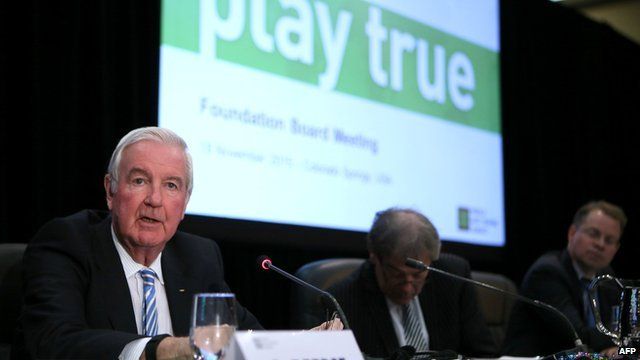
By Duncan Mackay |
World Anti-Doping Agency (WADA) President Sir Craig Reedie claimed that the Russian doping scandal is the “worst case of system failure… in the entire history of the anti-doping movement” but has helped focus people’s attitudes on the scale of the job that still needs to be done.
Opening the fifth World Conference on Doping in Sport, Sir Craig hailed the progress made since WADA was established in 1999, but admitted the controversy surrounding the state-sponsored doping system uncovered in Russia had dealt the credibility of the organization a significant blow.
“It has been two decades of progress, improvement and, of course, plenty of complex challenges,” he told 1,600 delegates, including International Olympic Committee President Thomas Bach.
“It is remarkable to think of how far WADA and, by extension, the global anti-doping program has come.
“Back in 1999, there was still no one single answer to tackling doping in sport.
“Every sport had different rules and countries had different laws so an athlete could, for example, be banned in one nation or sport but be able to compete in others.
“The anti-doping movement as we know it today was the result of crises in sport, in particular the Festina cycling scandal in 1998.
“At the time, doping started to be seen as the most serious threat to the values of sport.
“Accordingly, WADA was formed in 1999, at the first World Conference on Doping in Sport and started operating later that year as a unique 50-50 partnership between the Sports Movement and Governments of the world.
“What followed quickly in our first few years was the delivery of the first edition of the World Anti-Doping Code, harmonizing anti-doping policies, rules and regulations within sport organizations and among public authorities around the globe.”
Sir Craig claimed that, despite the criticism WADA regularly receives, it has largely fulfilled its mandate since it was established.
“Overall, the harmonization of this wide range of activities across all sports in all countries has been a remarkable success,” he told the audience.
“There are not many aspects of modern life that have achieved the level of international and cross-sport co-operation as anti-doping.
“It is a tribute to the commitment of athletes, Governments, International Federations, laboratories, National and Regional Anti-Doping Organisations and National Olympic Committees, as well as the International Olympic Committee, the International Paralympic Committee and other major event organizers that the system works as well as it does.”
But Sir Craig admitted the the scandal in Russia overshadowed WADA’s successes.
“Of course, that is not to suggest it is perfect,” he said.
“Clearly, there have been times when elements within the system have failed to live up to expectations.
“The worst case of system failure, certainly in my time as President, if not in the entire history of the anti-doping movement, has been with Russia.
“The revelations exposed by the WADA-led investigations of Richard Pound and Richard McLaren forced a sea change in attitude around the globe.
“Confirmation of that unprecedented level of cheating left the sports world in no doubt of the scale of the job facing WADA and has reawakened all stakeholders to the importance of sports integrity.
“Since then, with help from partners, WADA has helped rebuild the Russian Anti-Doping Agency (RUSADA) into the fully operational National Anti-Doping Organisation it is today, ensuring that the anti-doping program could resume effectively across that massive and sports-passionate nation.
“With Russian athletes and teams competing internationally in nearly all sports, leaving RUSADA as non-compliant indefinitely served no one’s interests except the cheats.”
Sir Craig defended WADA’s approach to dealing with Russia, including reinstating RUSADA last September when there were widespread calls for the ban to be extended.
“The WADA Executive Committee’s decision of September 2018 to reinstate RUSADA after three years of non-compliance, under strict conditions, broke a long-standing impasse between the Agency and the Russian authorities,” he said.
“By imposing those conditions, we now have gained access to the data and samples contained within the Moscow Laboratory that was, for so long, out of reach.
“It is currently being used to bring more cheats to justice with dozens of cases now proceeding through the various judicial channels.
“Evidence – uncovered by WADA – that a portion of the data may have been manipulated is still being investigated and sparked a fresh compliance procedure being brought by WADA in September 2019 against RUSADA.
“It should be noted that this latest procedure was brought under the legal framework of the new International Standard for Code Compliance by Signatories, which was not in force when RUSADA was first declared non-compliant in 2015.
“Clearly, we have all faced pressure to deal with the Russian situation effectively.
“Athletes need to know they are being protected and they expect us – WADA and the anti-doping community – to step up the fight.
“In short, they expect the rules to be enforced and that is exactly what WADA is doing.
“As we look forward, while WADA’s achievements have been considerable, this is no time to be resting on our laurels, and there will always be those who try to destabilise the anti-doping system.
“Harmonization through the World Anti-Doping Code, the International Standards and the UNESCO Convention is a constant battle.
“Not all sports, not all countries have the same priorities when it comes to anti-doping and, of course, they do not have the same budgets either, and that can affect the level playing field we want to provide for all athletes.”
Republished with permission from insidethegames.biz.